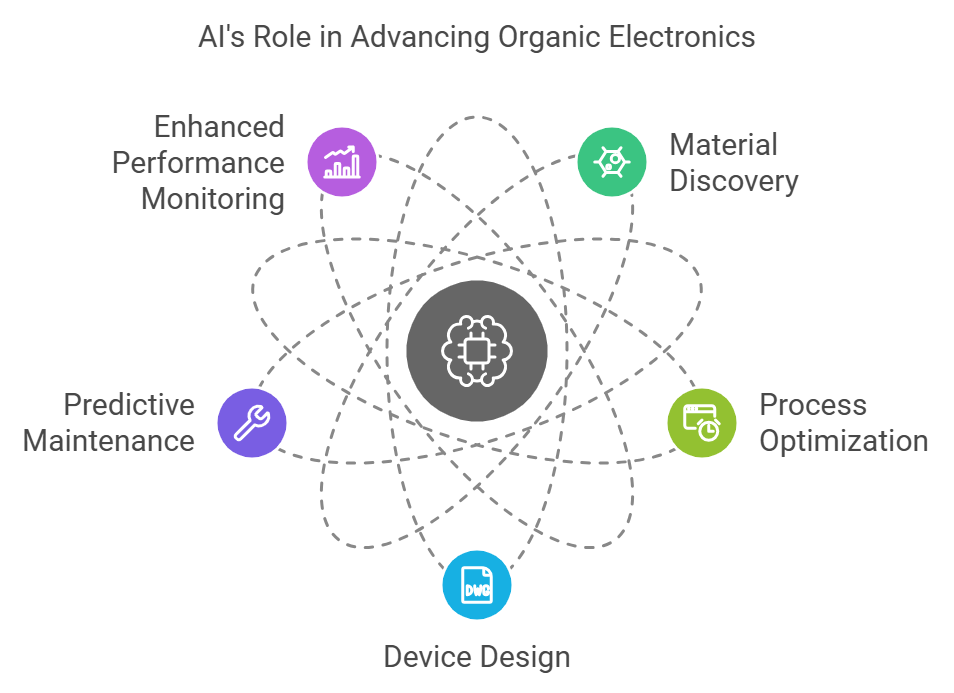AI and organic electronics are emerging as a potent combination that is transforming the electronics industry. Organic electronics, primarily based on organic (carbon-based) materials, offer flexibility, lightweight structures, and cost-effective production methods. When enhanced with AI, these materials can be tuned to optimize performance, adapt to various applications, and enable innovative functions. AI’s ability to process data and predict complex patterns is revolutionizing the design and functionality of organic electronic devices, impacting industries from healthcare to energy.

Asia Pacific region is the largest market for organic electronics. This is primarily attributed to the presence of major electronics manufacturing countries within the region, including China, Japan, and South Korea. China, in particular, has emerged as a global hub for electronics manufacturing, with a vast consumer base and a well-established supply chain. The country’s large-scale production capabilities and cost-effective manufacturing processes have contributed to its dominance in the organic electronics market. China’s robust electronics industry supports the production of a wide range of devices, including smartphones, televisions, and wearable devices, which are major applications for organic electronic components like OLED displays.
AI-Driven Material Discovery
AI significantly accelerates the discovery of new organic materials by predicting desirable properties and suggesting molecular structures that could exhibit them. Machine learning models analyze vast datasets of molecular configurations, predicting which organic compounds will deliver high efficiency, flexibility, or durability for specific applications. For example, in organic light-emitting diodes (OLEDs), AI algorithms can identify molecular structures with optimal luminescent properties, advancing display technology in smartphones, TVs, and other consumer electronics.

Applications in Flexible Electronics
Flexible electronics benefit greatly from AI-enabled organic materials. AI algorithms optimize the structural properties of organic semiconductors, which are essential for devices like flexible displays, sensors, and wearable devices. As a result, these materials become more durable and adaptable, opening possibilities for electronics that can be integrated into clothing or other bendable substrates. This development is especially significant in the healthcare sector, where flexible sensors monitor vital signs, offering more comfort and accuracy for patients.
Sustainable and Energy-Efficient Solutions
AI is also driving sustainability in the organic electronics industry. By refining production processes and predicting more efficient material combinations, AI helps reduce waste and energy consumption. Organic photovoltaic cells, for example, are emerging as a renewable energy source, capturing solar energy with lightweight, flexible materials. AI-optimized organic solar cells improve energy conversion rates, making renewable energy solutions more accessible and scalable.
Future Prospects and Challenges
While the integration of AI in organic electronics holds significant promise, challenges remain, particularly in achieving long-term stability and scalability of organic materials. AI can assist in this area by simulating the long-term effects of environmental factors, identifying materials that can withstand these stresses. Additionally, data privacy and energy consumption by AI models themselves are critical areas of focus for sustainable growth in this market.

The synergy between AI and organic electronics is a pioneering advancement poised to reshape the electronics industry. From flexible displays to sustainable solar energy, AI-enhanced organic electronics are facilitating breakthroughs in material design, energy efficiency, and innovative applications across various fields. As research progresses, we can expect these technologies to become increasingly integral to consumer electronics, healthcare, and renewable energy solutions, heralding a new era in smart, sustainable materials.
This dynamic field illustrates the power of combining AI with organic materials, and its advancements will likely continue to revolutionize the world of electronics.
